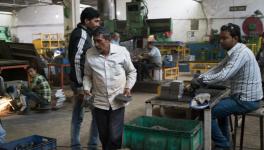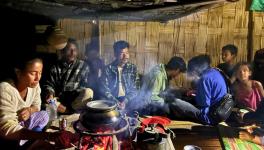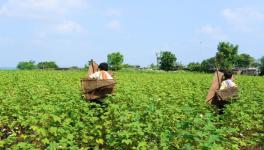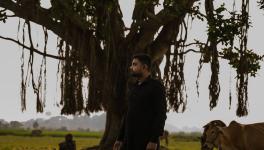Kerala Yatra Stresses Importance of Science to Counter New Threats
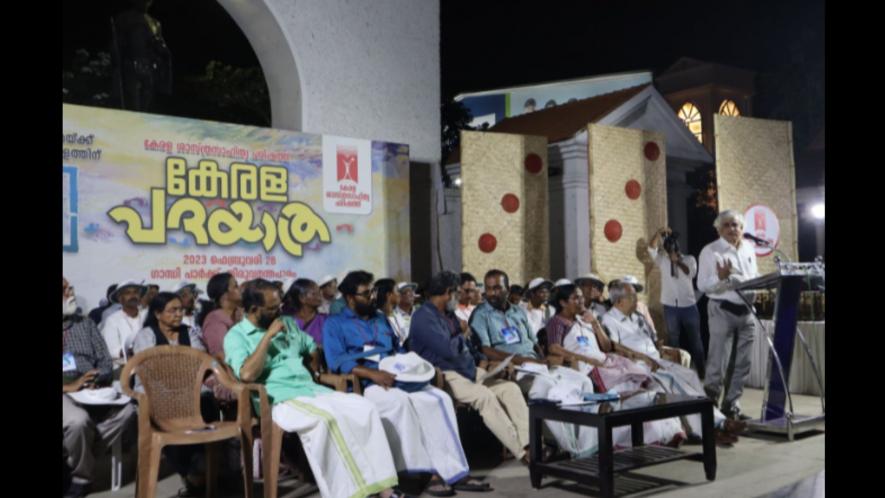
PARI founder-editor P Sainath inaugurates a public meeting on the concluding day of the KSSP foot march at Gandhi Park, Thiruvananthapuram, on Tuesday.
The Kerala Sasthra Sahithya Parishad’s (KSSP) 34-day foot march concluded in Thiruvananthapuram on National Science Day on Tuesday by highlighting the emerging economic, cultural, educational and environmental challenges faced by the state.
The KSSP, affiliated with the All India People’s Science Network, expressed serious concerns over crime against women and children and human sacrifices despite the highest
literacy in the state.
With the motto ‘Science for People’s Welfare, Science for Nava Keralam’, the march covered around 620 km across 12 districts. Retired Justice K Chandru inaugurated the march in Kasargod on January 26 while PARI founder-editor P Sainath was the chief guest of the concluding day.
Before the march, the KSSP held seminars on topics, including climate change, challenges in higher education, changing media and studies on socio-economic issues of Dalits, tribes, women, traditional industries and loans of rural women.
Kerala stands out on several human development indices thanks to the commitment to the people-centric development activities of successive governments.
KSSP state president and the foot march’s vice-captain B Ramesh told Newsclick that the “state made rapid progress due to the renaissance movement. The effective intervention by communist party-led governments have resulted in better education, healthcare, among other achievements”.
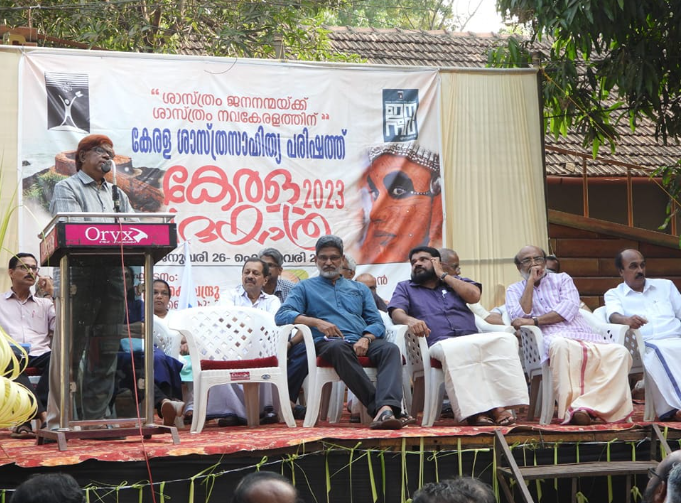
Retired Justice K Chandru inaugurates the foot march in Kasargod on January 26.
The KSSP highlighted the nation’s secular fabric, the need for a better scientific temper and the emerging challenges faced by the state despite the progress made.
“The major factors we identified in the state are the increased debt rate of individuals due to illness-related expenses and lavish marriage ceremonies. Another factor is the increase of
lifestyle diseases,” Ramesh said.
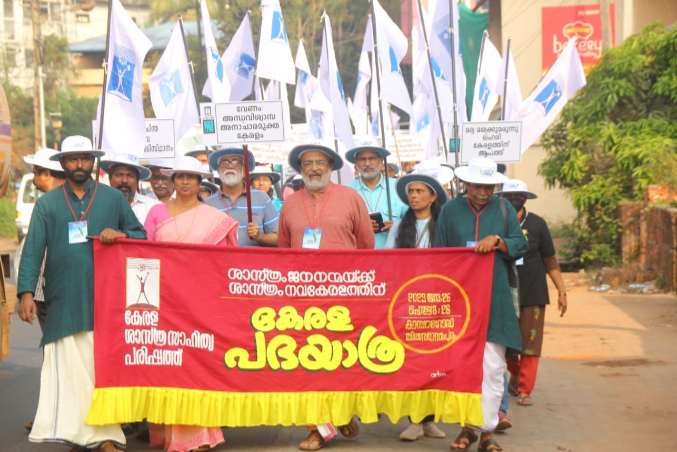
Kerala’s former finance minister TM Thomas Isaac was the Jatha Captain on the first day of the foot march.
The challenges faced by modern society, including centralisation by the Union government, undermining of democratic values, and parliamentary democracy were also the key discussion points in the foot march.
“Kerala is the only exception among several states to uphold democratic values and have a people-centric approach to development activities. The KSSP wants to protect this unique
feature of the state,” a KSSP statement published before the march read.
The KSSP has also played a crucial role in the state’s developmental activities by holding studies and research on the actual needs of the people, including education and healthcare, for several years.
Most recently, the state witnessed several extreme weather events leading to massive economic setbacks and damage to agriculture and infrastructure. The KSSP has been highlighting the environmental threats faced by the state.
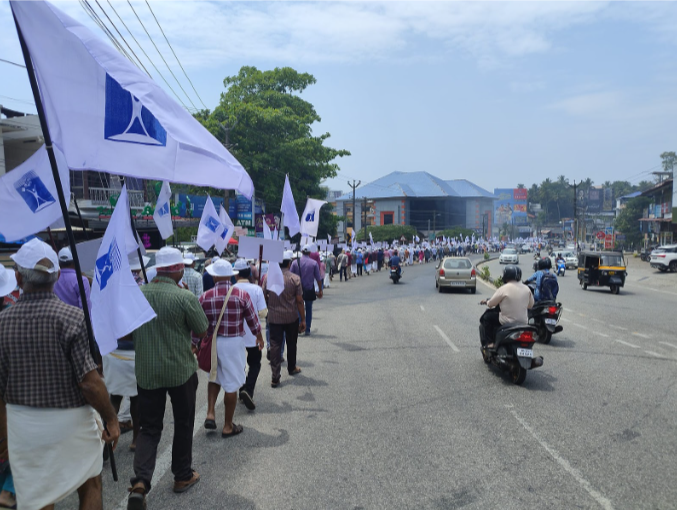
The foot march passes through parts of the Thiruvananthapuram district.
Sainath flagged the environmental issues faced by Kerala. “We live in an era of corporate-led development.
Corporations define the vision and path of development. For me, Kerala has stood for people-led development,” he told a public meeting.
On the impact of the pro-corporate policies and development, he said, “Corporate-led development is the biggest driver of climate and environmental, hunger and poverty crises. In this development method, rampant and uncontrolled consumption of natural resources follows. Kerala should not move away from people-led development.”
FOCUS ON MOTHER TONGUE-BASED EDUCATION
“We are on the verge of completing research on localised and general issues in 80 different locations in the state.
Once completed, we shall provide crucial data to the public and the government to plan the way forward to achieve the new model of development,” said KSSP general secretary Joji Kuttumel.
The KSSP also held 18 state-level seminars and workshops on the financial attacks on state governments, media and democracy, the Kerala IT industry and climate change besides hundreds of regional science lectures.
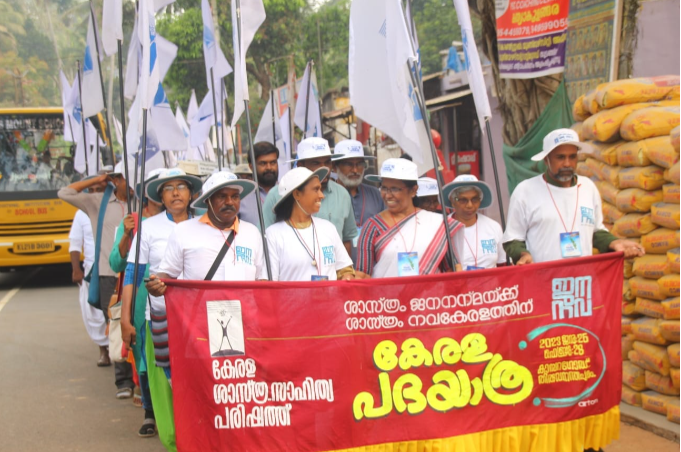
Kerala’s former health minister KK Shailaja was the Jatha Captain on the concluding day of the foot march.
The KSSP also opposes the National Educational Policy (NEP), which has been termed a step towards “communalising education”.
“Further, Kerala must address the increased interest in English-medium education and schools. Only mother tongue- based education would ensure better creativity and critical thinking. The implementation of NEP would destroy the higher education sector,” Ramesh said.
HUMAN SACRIFICES AND TRADITIONAL PRACTICES
Despite the achievements and progress, recent incidents of human sacrifices rocked Kerala. The KSSP has observed anincrease in the number of people believing in ancient religious practices, including black magic, leading to human sacrifices.
“The Supreme Court judgement on women’s entry to Sabarimala temple also showed a different face of society. When the floods and pandemic hit the state, the people unitedly fought for survival. But when an issue of religious belief arose, society was divided, exposing the lack of scientific temper,” Ramesh said.
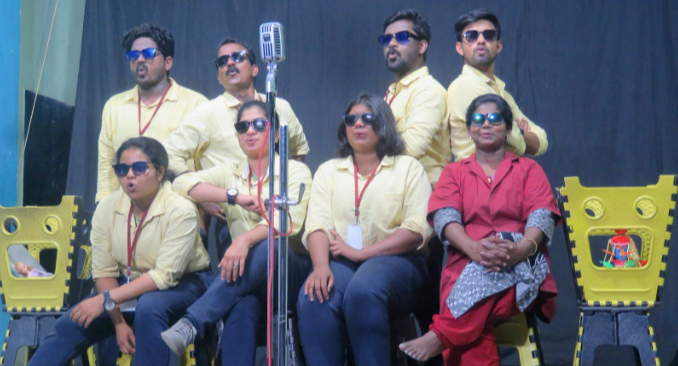
‘She Archives’, a play on gender inequality, was performed at all the 137 reception centres.
The increasing crimes against women and children was another issue flagged by the KSSP. “There has been a drastic reduction in discussion among families. This is another reason for the increase in traditional practices and attacks on women and children,” Ramesh said.
The KSSP aimed to exhort society to discuss such crucial ssues by bringing them before the public through the march.
The march was led by different political, social and cultural activists on all the 34 days as a mark of an inclusive approach to the issues that were discussed.
(Images: J Janith, KSSP Facebook Page, Muraleedharan Pelekkat and Jai Somanathan)
Get the latest reports & analysis with people's perspective on Protests, movements & deep analytical videos, discussions of the current affairs in your Telegram app. Subscribe to NewsClick's Telegram channel & get Real-Time updates on stories, as they get published on our website.










